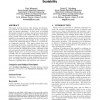Free Online Productivity Tools
i2Speak
i2Symbol
i2OCR
iTex2Img
iWeb2Print
iWeb2Shot
i2Type
iPdf2Split
iPdf2Merge
i2Bopomofo
i2Arabic
i2Style
i2Image
i2PDF
iLatex2Rtf
Sci2ools
GECCO
2006
Springer
2006
Springer
Fluctuating crosstalk, deterministic noise, and GA scalability
This paper extends previous work showing how fluctuating crosstalk in a deterministic fitness function introduces noise into genetic algorithms. In that work, we modeled fluctuating crosstalk or nonlinear interactions among building blocks via higher-order Walsh coefficients. The fluctuating crosstalk behaved like exogenous noise and could be handled by increasing the population size and run duration. This behavior held until the strength of the crosstalk far exceeded the underlying fitness variance by a certain factor empirically observed. This paper extends that work by considering fluctuating crosstalk effects on genetic algorithm scalability using smaller-ordered Walsh coefficients on two extremes of building block scaling: uniformly-scaled and exponentially-scaled building blocks. Uniformly-scaled building blocks prove to be more sensitive to fluctuating crosstalk than do exponentially-scaled building blocks in terms of function evaluations and run duration but less sensitive to ...
| Added | 23 Aug 2010 |
| Updated | 23 Aug 2010 |
| Type | Conference |
| Year | 2006 |
| Where | GECCO |
| Authors | Paul Winward, David E. Goldberg |
Comments (0)

